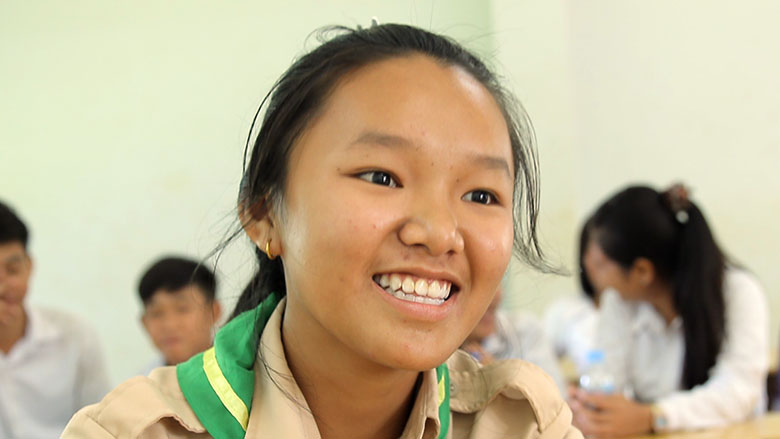Nang Rith Kanha, a 9th grade student at Hun Sen Taing Kok High School in Kampong Thom province, confessed that she cheated during the entrance exam that got her into the advanced class. Then she failed her class exams a month later. She was filled with regret.
“I was lazy to study because I thought that my friends would allow me to copy their test again,” Rith Kanha recalled. She failed her first exam because it was strictly monitored by the teachers and parents. “Then, I realized that I had only passed the previous exam because of someone else’s knowledge, not my own. I felt so ashamed.”
The strictly monitored exams and her own reflection gave Rith Kanha a chance to change. Since failing her first exam, she put more effort into her studies. As a result, she passed all her other exams during the year, including earning a top score on her recent final exam.
Improving lower secondary education to meet minimum standards is a goal of the Secondary Education Improvement Project (SEIP), which is supported by the World Bank. The aims to strengthen school management, improve teaching and learning at classroom level by upgrading teacher qualifications, providing mentoring, conducting proper and supportive teacher evaluation, and improving learning facilities.
The project provides the School Improvement Fund at the Provincial and District Office of Education to strengthen school-based management. It also supports lower secondary school teachers to upgrade their qualifications, especially in the areas of mathematics, physics, biology, chemistry, Khmer, and history. One hundred existing schools are being improved by constructing or renovating school infrastructure and supporting schools and teachers to provide the right conditions for effective teaching and learning while 30 new schools will be constructed.
Under SEIP, the traditional ways of teaching and learning in the Cambodian school system have been modified. Students are assigned to discuss topics in groups and present their results to the class. By providing ideas or guidance and letting students do their own work in groups, teachers spend less time writing on whiteboards. Parents are invited to monitor all types of exams to ensure everyone does their own work and to participate in the development of school plans and monitoring their implementation.

